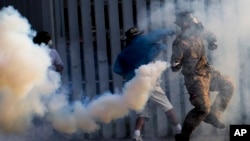BANGKOK —
In Thailand, fresh clashes between police and anti-government protesters Thursday left at least one police officer dead and dozens of people wounded. The violence prompted the country’s election commission to call for a postponement of the February 2 general election, but the government said that would only cause more violence.
Protesters, led by student groups, stormed a sports stadium in Bangkok where officials were registering candidates for the scheduled vote. They were met by police who fired tear gas and rubber bullets to disperse them.
The Thai Election Commission released a statement warning of further violence if the government holds firm to the February 2 poll date. Prime Minister Yingluck Shinawatra has previously rejected calls to delay the vote. She had called the early election following weeks of protests calling for her to step down and hand power to an unelected council.
Economist, Somphob Manarangsang, said there now appeared few paths to ease the political standoff.
"We know that the tension, the situation is going to be more tense, increasingly more tense, with very limited outlet now given the current situation. It's really unbelievable. We can see that the situation this week, particularly this morning, so it is not difficult to foresee the circumstances taking place before the election and even on the general election day," he said.
Some 30 parties have registered for the polls despite the protests. But the opposition Democrat Party is boycotting the vote, saying political and election reforms needed to be implemented before new polls go ahead.
Opposition Democrat Party leader, Abhisit Vejjajiva, said the vote would fail to end the political divide in the country.
"The problem we have at the moment with the 2nd of February elections is that people no longer trust political parties and they feel the elections would neither be fair nor credible and the results would not be accepted by all sides regardless of who wins," he said.
On Wednesday Thai Prime Minister Yingluck attempted to answer the demands for reform by announcing the creation of a National Reform Council. The body would consist of some 2,000 representatives would be recruited from various professions to oversee reform proposals.
But the anti-government People's Democratic Reform Committee (PDRC) that has been staging rallies since November has rejected the proposal. Bangkok has been besieged by tens of thousands of anti-government protestors in recent weeks calling for political reform and an end to the perceived influence of Prime Minister Yingluck's older brother Thaksin Shinawatra, who lives in exile to avoid a two year prison term for corruption.
The violence is the most severe since 2010 when anti-government protests left 90 civilians and military personnel dead.
Protesters, led by student groups, stormed a sports stadium in Bangkok where officials were registering candidates for the scheduled vote. They were met by police who fired tear gas and rubber bullets to disperse them.
The Thai Election Commission released a statement warning of further violence if the government holds firm to the February 2 poll date. Prime Minister Yingluck Shinawatra has previously rejected calls to delay the vote. She had called the early election following weeks of protests calling for her to step down and hand power to an unelected council.
Economist, Somphob Manarangsang, said there now appeared few paths to ease the political standoff.
"We know that the tension, the situation is going to be more tense, increasingly more tense, with very limited outlet now given the current situation. It's really unbelievable. We can see that the situation this week, particularly this morning, so it is not difficult to foresee the circumstances taking place before the election and even on the general election day," he said.
Some 30 parties have registered for the polls despite the protests. But the opposition Democrat Party is boycotting the vote, saying political and election reforms needed to be implemented before new polls go ahead.
Opposition Democrat Party leader, Abhisit Vejjajiva, said the vote would fail to end the political divide in the country.
"The problem we have at the moment with the 2nd of February elections is that people no longer trust political parties and they feel the elections would neither be fair nor credible and the results would not be accepted by all sides regardless of who wins," he said.
On Wednesday Thai Prime Minister Yingluck attempted to answer the demands for reform by announcing the creation of a National Reform Council. The body would consist of some 2,000 representatives would be recruited from various professions to oversee reform proposals.
But the anti-government People's Democratic Reform Committee (PDRC) that has been staging rallies since November has rejected the proposal. Bangkok has been besieged by tens of thousands of anti-government protestors in recent weeks calling for political reform and an end to the perceived influence of Prime Minister Yingluck's older brother Thaksin Shinawatra, who lives in exile to avoid a two year prison term for corruption.
The violence is the most severe since 2010 when anti-government protests left 90 civilians and military personnel dead.











